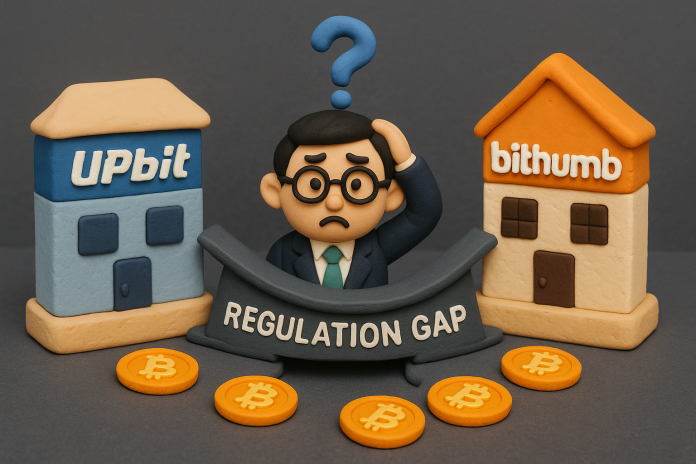
Korea’s two major cryptocurrency exchanges, Upbit and Bithumb, have both rolled out crypto lending services in recent weeks, drawing significant attention from investors. However, concerns are mounting that the underlying structure of these offerings closely resembles short-selling, raising questions about potential regulatory blind spots.
Upbit introduced its “Coin Lending” service in early July, allowing users to borrow Bitcoin by putting up Korean won as collateral. Users can borrow BTC up to 80% of their collateral value, with loan amounts ranging from KRW 100,000 to KRW 50 million. A 0.05% application fee applies, along with a usage fee of 0.01% every eight hours. An additional 1.5% fee is charged if the loan is forcibly liquidated.
Bithumb expanded its “Lending Plus” service on July 9, offering up to 4x leverage for 10 types of crypto assets, including Bitcoin. The service charges a 0.05% daily fee, plus a 1% risk management fee for automatic repayments.
Critics point out that this model mirrors typical short-selling or margin trading. Borrowed assets can be sold immediately, and if prices drop, the user can repurchase them at a lower price and repay the loan. Industry experts warn that if a significant number of investors take short positions in a declining market, volatility could spike dramatically.
Regulatory concerns are also growing. The Financial Services Commission is reportedly reviewing whether such services constitute unlicensed lending or derivative trading. Currently, there are few safeguards in place—there are no clear investor qualification standards, disclosure requirements, or clearing systems.
While both exchanges offer some protective measures—such as real-time loan-to-value monitoring, forced liquidation alerts, and educational content—users bear full responsibility for losses. Both platforms also include clauses that allow service suspension or delayed liquidation during market turbulence.
On the flip side, some see potential for domestic platforms to reclaim leverage demand previously flowing to overseas exchanges. During Bithumb’s beta phase, lending applications reportedly surpassed KRW 33 billion in a single day.
Still, experts warn that without proper oversight, retail investors could be exposed to significant risk. Calls for legal clarity and robust risk management frameworks are intensifying as these services continue to expand.



![[November]Uptober No More](https://coinhubkorea.com/wp-content/uploads/2025/10/Whisk_d78880efb01a730907f4be201effefe1dr-1-100x70.jpeg)


